#Tolkien LACE
Text
I’ve been wondering recently whether or not Elvish Wardens and other fighters are allowed to be present during the births of their children?
Like, if you’re going LACE compliant, then most elves who can birth children won’t become warriors unless necessary and even then, they’ll try to minimize the deaths they cause so they can physically create life.
So like obv you could be a warrior and a someone who births, but I wonder if at one point there was a rule or at least a cultural norm about not having warrior-class parents in the birthing chambers? My initial gut reaction would be to say yes (especially given fathers weren’t allowed in with their wives until I believe the 1950-60s in the UK in which Tolkien based his knowledge off of), but also both parents are expected to spiritually feed their elfling after their birth so maybe not? Or maybe the act of birth itself is considered so high-concern that the answer would still be no.
Anyone have any elvish birthing canons and customs? Curious about thoughts related to LACE and non-LACE!
#Tolkien elves#Tolkien meta#elves#elvish gender expression is different okay#elvish pregnancy and birth#lotr#lord of the rings hcs#lotr headcannons#silm#silmarilion#tolkien legendarium#Tolkien LACE#LACE compliance#non LACE compliant
10 notes
·
View notes
Text

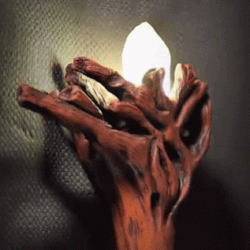


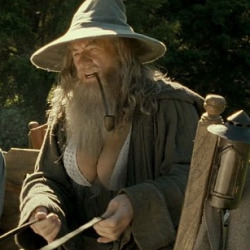
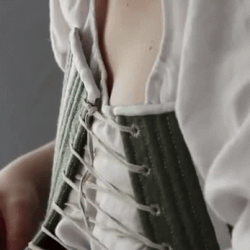
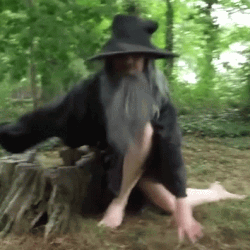
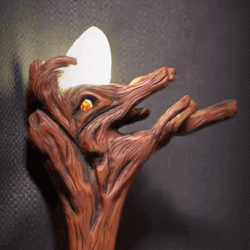

🔮🔮 Gandalf Big Naturals Stimboard 🔮🔮
x x x / x x / x x x
[Image description: a 9 gif stimboard; from left to right.
First line: a gif of someone in Gandalf cosplay sitting on a large tree stump in woodland leaning back on their hands and kicking up their bare legs sensually, a gif of light being played over a replica of Gandalf's branch-like staff with a light up 'crystal' inside, and a gif of someone in Gandalf cosplay standing in woodland facing away from the camera before they bend over and stick out their ass.
Second line: a gif of someone wearing an 18th century shift and stay garment tucking the lace into the top of the stay, a still meme image of Gandalf the Grey (Lord of the Rings) with a photoshopped bust, and a gif of someone lacing up a stay over their 18th century shift.
Third line: a gif of someone in Gandalf cosplay in woodland climbing down from a large tree stump and crawling provocatively across the ground, a gif of light being played over a replica of Gandalf's branch-like staff with a light up 'crystal' inside, and a gif of someone in Gandalf cosplay miming a kiss towards the camera.
End of image description.]
#cursed stimboard#I can't BRAETHE IM SORRY#flashing gif#cosplay#people#crawling#bare legs#clothing#corset lacing#lights#I can feel the ghost of JJR Tolkien behind me shaking his head because he knows that I know that stays are from the 18th century#and LOTR is medieval-esque
198 notes
·
View notes
Text
Gil Galad : *stressed*
Elrond : *hand him stress ball" Take this, for your stress relief
Later
Thranduil : alright who is the one that gave Gil Galad stress ball?
Elrond : me
Thranduil : YOU TAKE THAT BACK!
Elrond : why?
Thranduil : BECAUSE HE KEPT BEATING MY FATHER WITH THAT BALL!
#the hobbit#the lord of the rings#rings of power#incorrect tolkien quotes#incorrect lord of the rings quotes#tolkien#elrond#hugoweaving#incorrect silmarillion quotes#robert aramayo#incorrect hobbit quotes#incorrect rings of power quotes#thranduil#lee lace#gil galad#oropher
91 notes
·
View notes
Text
I do not care how focused on Elrond’s parentage your fic is, if the first person he hugs when he gets off the boat to Valinor is not Celebrian, you will knock me completely out of my suspension of disbelief and I will find myself no longer on the white shores of Valinor but laying on my couch, dazed and staring at a phone screen full of LIES.
#I said this very intensely but I don’t think this is a controversial opinion#tolkien#jirt#lotr#silm#Elrond#Celebrian#I love Elrond’s parent drama so much#but let him hug his goddamn wife#the only acceptable alternative is if Galadriel hip-checks him into the ocean so she can hug her daughter#which I have never seen but would be hilarious#Galadriel goes to hip check Elrond out of the way and Earwen snags her in her own agressive motherly affection#laced with SO MUCH accusation about not coming home for literal ages#Galadriel arrives and immediately receives a motherly dressing down#OMG MOM NOT IN FRONT OF THE HOBBITS THEY THINK IM COOL#anyways having arriving in Valinor thoughts
875 notes
·
View notes
Text
Dropping all this Rings of Power news makes me feel like Dionysus giving new campers the orientation, but here you go — enjoy your new Celebrimbor *pops a Diet Coke angrily*
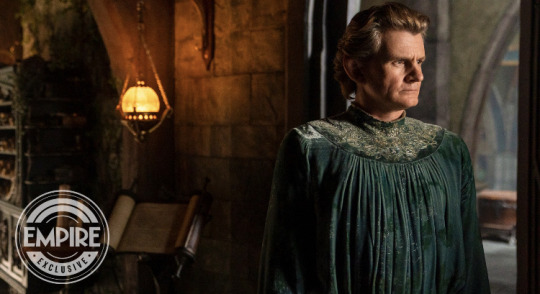
#we just ain’t winning#could’ve had sexy twink tragedy romance with long black locks#fuck sake just throw a lace front wig on Dylan O’Brien and call it a day#I should be in charge of casting#lord of the rings#lotrdaily#lotr movies#elves#lotr shitpost#silmarillion#the silmarillion#mairon#sauron#lotr#tolkien#celebrimbor#tyelpe#silvergifting#lotr on Amazon#lotr Amazon#rings of power#rop#lotr rop#lotr on prime
1K notes
·
View notes
Text
“Divorce core is so powerful.”
—Nerdanel, probably.
Credits to @areyoutrueorfalse for this gem.
#tolkien#shitpost#incorrect tolkien quotes#silmarillion#crack#incorrect silmarillion quotes#nerdanel#fëanor#feener is a weenus#divorce#divorce core#oh yeah good old valinor#elves fall in coma remarry and divorce#wild times i tell you#lace is valinorean propaganda bc valinor elves want men to believe they behave properly
69 notes
·
View notes
Note
Do you think elves care about which person specifically proposes marriage? Is there a rule? In my culture, it's supposed to be the guy but younger people have normalized either person proposing as acceptable (which I think takes a lot of the pressure off the guys). I was curious as to what you think or if you had any information to share on that. Thank you, again, for writing this blog.
A pleasure to be of service writing for you all 🫡
As for your question, nope. In elven culture, they court with the intent to marry and spend forever with the person of choice. With this being said, neither parties are pressured since it doesn't matter who proposes for marriage is the goal for them. They know they must marry otherwise they wouldn't court—the dating ethics of the modern world isn't something that is found within Tolkien's culture, so the same rules don't apply.
What I do believe is at a certain point in the courtship, they would come together and decide if now is the time to enter that next stage in their life which brings them to the engagement. This is an act both parties agree upon and exchange silver rings on a chosen day with the family present. From there, they enter an engagement period that can range from a few months to a year before they wed.
So elves don't go through marriage proposals the way we do in the modern world, and it wouldn't matter who suggests. All that matters is that they can come together and exchange their silver rings to mark their betrothal and journey to marriage.
It's rare for an elf to skip the betrothal period and rush into marriage. The elf that occurred to was Aredhel and it was pure tragedy for her. I don't know of any other who skipped the betrothal period and went straight into marriage.
Hope this helped! 🤗
For more info: My Info Corner
20 notes
·
View notes
Text
None of these words are in the Laws and Customs of the Eldar
12 notes
·
View notes
Text

More intentional revamp of my ancient Idril design
#it was kind of an accidental kirtle that wasn’t one. so now it is.#+ some vaguely Elizabethan neck shit.#of this were high formal wear I would’ve done the ostentatious collar/cone bodice#that’s the half baked gondolindrim thesis. don’t think abt gondolindrim that much#DO know idril starts wearing white instead of a heavy silver brocade in memory of aredhel tho#tolkien#idril#idril celebrindal#gondolin#the double ponytails I ^draw her with also would Elizabethan as an updo. happy accident I’m realizing#*would look#possibly anachronistic lace pattern cw. I’m not looking it the fuck up
42 notes
·
View notes
Text
What Does the Laws and Customs Among the Eldar Say? Part One
So I have some posts about speculative bio with regards to elves and humans coming up but I wanted to go into this text first! This is mostly a summary and synthesis without my own commentary as if I added my own thoughts, this would be even longer. But please feel free to give me areas to talk more about!
Laws and Customs among the Eldar is a controversial text by JRR Tolkien concerning the Mind, Body, Spirit and relationships of elves. It was published in the text Morgoth’s Ring which is one of the Histories of Middle-earth and its place in the legendarium as Cannon is debatable. Debatable also was the purpose of the text and whether it is intended to be a philosophical Treatise or a moral doctrine or a biological reality for the elves. Ælfwine, or Elfwine, A character in The legendarium is credited with the editing of this text as well as other parts of the histories of Middle Earth adding another aspect of meta to it.
Laws and customs starts out comparing and contrasting the development of elves with that of humans. The text states that elves grow more slowly in body but more quickly in mind and develop a Mastery over their bodies sooner than human children do. It also says that humans and elves are more similar to each other when they are young. This information matches with what is said in The Children of Húrin by the character Sador when asked about elf children. The exact timeline of development is unclear however it does say that a human might reach their full height while an Elven child of the same amount of years still appears to be at the age of 7 in body. And that elves did not reach their full stature until about fifty years. This information is contradicted or confused by other pieces of information elsewhere in the legendarium
Marriage is also said to be the norm for the elves outside of ill fate or strange circumstances. Obviously this is not true in the Silmarillion where a high percentage of characters do not married however it's possible that they fall under the ill fate or strange circumstances category. They marry shortly after their coming of age, at about fifty. Again, this seems to be contradicted elsewhere in Tolkien’s writing. The elves, LaCE says, have few children with four or more being extremely rare. Their children require little teaching or governing. Elves wed only once.
The next part of the text talks about engagement relations. The lock of gendered roles for the initiation of these Traditions is very interesting. Someone who wishes to propose to another gives them a silver ring and they are generally engaged for a year or more. During this time there is an ironclad law that the betrothal can be revoked in which case the Rings are melted down and the metal is never again used for marriage rooms. The text goes on to say that the revoking of this engagement is extremely rare and that elves are rarely deceived by their own kind and also are not usually swayed by desires of the body. It appears to be a more delicate way of saying that they are rarely motivated by lust alone or at least sexual lust.
Elfwine then says that for the Eldar, “even in Aman”, not all were married and that unrequited love was one of the few sources of sorrow in Aman. He describes a philosophical debate where some claim that sorrow from unrequited love was an aspect of the marring of Arda whereas others claimed that it was simply the nature of love itself and the result of Fëar being free to choose.
Elven weddings take place after over a year of the engagement and the families of the couple celebrate at the feast which represents a joining of the houses.
The name of Eru is spoken at weddings but seldom elsewhere. Mortals it is said have never heard the vows or marriage blessings said in entirety. The mother of the bride and father of the groom join hands with the mother naming Varda and the father naming Manwë though it is implied this is not always the wording.
Among the Noldor it was a custom that the mother of the bride should give a gift to the groom, usually a jewel on a chain or and the father of the groom should give a gift to the bride.
These traditions and others importantly were not necessary for a marriage to take place but are considered gracious and an opportunity for the parents of the couple to express their love and blessing as well as a way to represent the joining of the houses as well as of the couple. Indeed during prosperous times, it was considered ungrateful or ill mannered to forgo these traditions though according to laws of the Eldar, anyone unmarried can marry without official ceremonies.
LaCE states that the true consummation of a marriage is “bodily union” which formed an “indissoluble bond”
The next part of the text describes the creation of children. Elves are pregnant for one year exactly between the “Begetting” and the birth. It is the Begetting Day that is celebrated each year. It is common for this to be in the spring. It is common misconception among humans that elves can become pregnant throughout their life however this is not true, Elfwine says, and that “the life of elves is the life of Arda” and that “body and spirit are not separated but coherent”. This means that the weight of memories and the passing of time does limit elves ability to reproduce and they typically do so in their younger years.
LaCE says that children are almost always born shortly after the marriage, regardless of when the marriage takes place and that once this ‘will and desire’ is exercised, the couple will turn their energy to other matters.
It is also said among the Eldar that greater physical and emotional energy
While elves are married forever, the couple might not always live together and their separation doesn’t indicate trouble in their marriage unless it takes place during pregnancy or the early years of childbirth.
Next, Elfwine says that neri (elven men) and nissi (elven women) are equal in matters not related to childbirth and reproduction. Despite this however, the text immediately follows up with the caveat that it is said that nissi bring new life into the world much other change and invention is brought about by neri.
“There are indeed some differences in the natural inclinations of neri and nissi and other differences that have been established by custom”. The art of healing is thought to be the domain of nissi and it was said to be neri who fought in times of need. It was said also that killing, even if necessary or in self defense, diminished the power of healing and it was due to this that nissi did not usually take place in hunting or war rather “than to any special power that went with their womanhood. Indeed in dire straits, nissi fought valiantly and there was less difference in strength and speed elven men and women who had not born children than is seen among mortals” (emphasis added by me)
Now, there were many elven men who also were skilled in the art of healing and like women, they did not hunt or go to war.
Among the Noldor, the making of bread is done mostly by women and the cooking of other food is usually done by men. Nissi are also more commonly skilled, it is said, in fields and gardens, textile arts, playing instruments, and the lore of the Eldar and their history. Whereas neri were more commonly smiths and wood or stone wrights, jewelry makers, poets and linguists, and love the wilderness more.
Despite this divide, the last part of this section of LaCE claims
“But all these things and other matters of labor and play, or of deeper knowledge concerning being and the life of the world, may at any times be pursued by any among the Noldor be they neri or nissi”
The Next Part will go into the section on naming
55 notes
·
View notes
Text
Lace & Attention - Idril x Meleth

Written for @jaz-the-bard...a pairing I had never written before (which usually doesn't stop me).
Please, have a bittersweet slice of wlw from me!
Lots of love!
Words: 1 030
Characters: Idril x Meleth
Warnings: Sadness, longing, jealousy, disrobing, relative nudity, sexual innuendo

Meleth frowned as she left the boy’s room; she had not sought to distress him, but her heart oft misgave her, and she found herself helplessly afraid of the lingering shadows beleaguering their once fair city.
It surely was better that he knew, she thought frantically, and yet she couldn’t shake the memory of his innocent face, marred by fearful, uncomprehending tears as he listened to her paralysing, terrifying tales of woe and warning.
“Is he asleep?”
On some nights, Meleth would have preferred to be addressed with the absent-minded politeness her Lady displayed when dealing with other servants and helpers, and she resented herself for her weakness.
The one who had been named after a love she would never fully call her own nodded demurely, avoiding Idril’s gaze in the polished mirror like a coward.
“Have you seen Lómion tonight?”
Stiffening, Meleth now shook her head.
Yes, at times, she wished to be invisible and unheeded so as to be spared the searing heat of that luminous gaze, and the reference, no matter how passing, to her Lady’s cousin always made her flinch.
“I wonder what preoccupies him so,” Idril mused aloud. “He’s seemed distracted of late.”
I care not, the handmaiden wanted to scream. Why should I waste a single precious thought on that sneaking thief?
She knew that she was being unfair to the King’s nephew—a pitiful orphan who had found refuge in Gondolin like so many others—but she couldn’t help the burning resentment and spite, rising like acid within her fair throat every time her mind but brushed the mere shadow of that untrustworthy creature.
“Do you require my aid?” she asked hastily, moving deftly to Idril’s side to help her unpin the golden coils of her hair and undo the many intricate fastenings of her lavish gown before the other could either accept or refuse her offer.
Once upon a time, Meleth remembered, she had been the only one to gaze upon the delicate lace of Lady Idril’s undergarments, and she bemoaned the loss of that privilege more often than she wanted to admit.
Of course, she had always known that their love—self-evident and tender as the clean river water in summer—had been inevitably doomed to run dry before long. Idril was the king’s daughter and heir after all; matrimony and motherhood were her hallowed duties, and not even she could outrun her fate.
Thus, Meleth had made her peace with Tuor for it made no sense to begrudge one who had been foretold by every sign—he and Idril had been fated, and all the desperate devotion in this marred world could not have altered the course of destiny.
“Do you remember this one?” Idril hummed, letting her long, slender fingers travel along the beautiful filigree of the fabric hugging her firm breasts.
“How could I forget?” Meleth whimpered. The intimate garment had been made by a true master, and, upon picking it up for her beloved, she had caressed the impossibly fragile web of silken threads with wide-eyed wonder for much longer than was appropriate or commendable for one of her station in life.
Back then, before the arrival of those accursed males who had depleted and polluted the source of her joy, Idril had chuckled that she had commissioned the underwear as a gift for Meleth.
“To be beautiful for you,” she had said, her eyes as radiant as the midday sun, cutting through the endless blue of a cloudless sky.
Meleth recalled that she had wept, confessing fervently that Idril would always be the most gorgeous to her. Every movement, every kiss, every sweat-stained embrace that had followed were burned into her memory indelibly, but she was too proud to repeat words that had lost their weight and meaning by being reduced to a faint echo of the confessions and declarations Idril now heard every day.
“You’ve always taken such great pleasure in lace,” Idril went on, blissfully unaware of the turmoil ravaging her former lover’s heart and soul. “And you take such good care of my beloved son—I wondered whether…Do you ever miss me? Us?”
At that very moment, as all the dams broke, Meleth realised that the torrent of her ardour had not been quenched by having to share Idril with those whose attentions were so much more legitimate and welcome than her own.
“Always,” she admitted tersely. “Nevertheless, I completely understand…”
You are married now, and you’ve given him a son. You are bound to them and to that miserable miscreant by blood, which is so much more powerful than wisps of lace and a steady stream of earnest, unpretentious love.
She didn’t speak those words, though, for she knew only too well how little they would change, and she wanted to spare both of them the pain and humiliation to recognise their own helplessness in the face of Powers far greater than their own.
“You cannot give back what you didn’t take from me,” she added softly, folding Idril’s rich, luxurious garments with meticulous care to distract herself from the raging storm of unadulterated pain lancing through her whole body.
“You’d rather lose me than share me?” Idril asked sharply, and Meleth sighed. How she adored Idril when her gaze grew fierce and gleaming like an unsheathed blade!
“I’d take anything you’d grant me—I am not beyond being selfish and proud. However, many are vying for your attention and goodwill nowadays, and I am woefully aware that I could never compare to the glory of their births and deeds!” Meleth spat, ultimately unable to contain the poison of envy and hurt flooding her dry mouth and drowning her from the inside.
Instead of answering, Idril rose in a cloud of fragrant warmth and slung her soft arms around the stiff frame of her friend and eternal paramour. “Don’t be silly,” she whispered, letting her full lips espouse the curve of Meleth’s flushed ear. “My husband will not join me tonight, hence why I asked whether my wayward cousin has been sighted. Either way, why don’t you join me? After all, I am wearing your underwear to entice you! Did I succeed?”

@fellowshipofthefics And another one!
As ever, devotedly yours!!!
Lots of love and well-wishes!
-> Masterlist

#og post#Dark Romance Prompts#Sweet and Spicy Bingo#Sweet#Fanfiction#writing#IDNMT writes#jrrt#Tolkien fanfiction#Lace#Attention#Meleth x Idril#Idril#Meleth#Maeglin#tiny bit sad#fluff#Eärendil
4 notes
·
View notes
Text
11 notes
·
View notes
Text
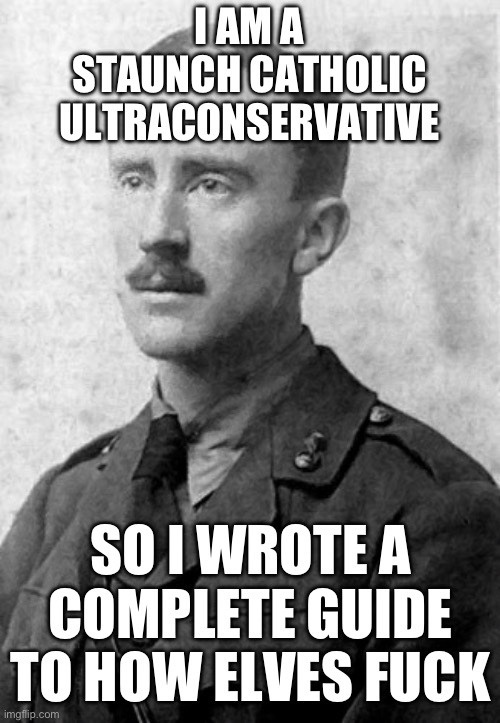
#the joy of elf sex#elf fucking#elf sex#lace#silmarillion#tolkien#lord of the rings#lotr rop#lotr#lotr trop#fantasy#the hobbit#jrr tolkien
13 notes
·
View notes
Text
“Is it odd that I have detailed headcanons about how sex works for elves and dwarves when I don’t even write smut?” the puritan in my brain starts to ask, before I pick up LaCE and bludgeon them to death with it because if John Ronald Reuel Tolkien himself can write about elf-fucking for his world building, why in hell can’t I?
#anyway: kill the cop in your head#write without shame#fuck purity culture. in the ass.#elves#dwarves#my stuff#world building#jrr tolkien#LaCE#lotr headcanons
19 notes
·
View notes
Photo

‘I wasted my time,’ he said, ‘though the hours seemed pleasant. But all such things are short-lived; and the joy in the making is their only true end, I guess.’
Sador Labadal
#tolkien#sador labadal#The Narn#no I don't think about this quote constantly why would you think that#especially not when making lace#the carving is very Urnes#because that is THE BEST#maybe sador had seen this style at barad eithel#his apron is culturally significant to me btw#AND#yay follower milestone surprise O.O#thank you guys!
37 notes
·
View notes
Note
Ok so I know for elves sex=marriage but what if an elf has sex before marriage with their lover ?
Like do they get shamed or die or something? (IDK OKAY 😭😭)
I really went off on this answer for you >.<
As far as LaCE states, sex = marriage. There's a whole explanation about their marital process of being betrothed for one year and then wedding at the altar before the eyes of Eru (or Manwë and Varda??). The act of of sex is how the elves complete their marriage (consummation) and form their final bond between each other. However there were probably records of some elves just marrying right away (probably doing a quick exchange of vows and rings and jumping into bed).
Hypothetically speaking, lets say you have a high class couple (one's royal the other is a lord/lady) and a wedding ceremony was planned and the entire public knew about their betrothal and so forth, then in secret, they engage in sex out of lusting for each other, shame could play a part there. This would push for them to properly wed quicker to avoid shame upon their house.
Then, you have to remember the process Tolkien described elves' marriage had a lot to do with his Catholic beliefs. That meant, wedding at an altar and then having sex was the traditional method that all elves abided by. Thus, having sex before marriage (more so in Valinor) would have been consider improper; people would ill-talk and such. Even as they moved to ME, I don't see elves rushing for the quickest method (sex) to get married, since they enjoyed celebrations. So a wedding was a huge highlight and a must to celebrate a joyous moment in their lives.
As for the dying part, elves didn't die if they had sex before wedding, however, (see below the cut)
If an elf had intercourse forced upon them, their fëa would leave their bodies and the they would die (as stated in LaCE and also stated that no elf had ever forced their partners, even though we had Eöl using enchantments upon Aredhel but it was then stated that she was "not unwilling" but imo it sounds forced).
"Among all these evils there is no record of any among the Elves that took another's spouse by force; for this was wholly against their nature, and one so forced would have rejected bodily life and passed to Mandos. Guile or trickery in this matter was scarcely possible…for the Eldar can read at once in the eyes and voice of another whether they be wed or unwed." (LACE footnote 5)
So marriage and sex was always consensual between both parties and shame played a part depending on the wedding procedure.
Edit: I know it said "took another spouse by force" and nothing about forceful taking in general for unwed elves, but honestly, even if an elf were to be taken by force, since they experience emotions on an entirely different wavelength than us, who's to say that they can't die from being taken by force. Their freedom and consent were taken only be defiled. Them choosing to die can be a (optional) thing.
66 notes
·
View notes